Uncategorized
When the Jews of Dubova were killed and raped by their neighbors
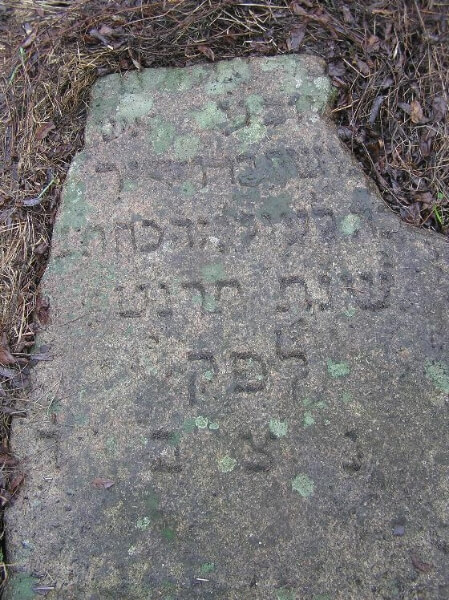
אין 1919, בעת דער רוסישער בירגערקריג, האָבן באַנדעס פּויערים באַפֿאַלן די ייִדישע אײַנוווינער פֿונעם שטעטל דובאָווע, אין דער הײַנטיקער אוקראַיִנע. טראָגנדיק מאַסקעס כּדי זיך צו פֿאַרשטעלן, האָבן זיי דערהרגעט, געממיתט און פֿאַרגוואַלדיקט זייערע ייִדישע שכנים אויף אַזוי ווײַט, אַז דאָס שטעטל איז ממש פֿאַרטיליקט געוואָרן.
ווען רחל פֿײַגנבערג, אַ ייִדישע פֿרוי וואָס האָט איבערגעלעבט דעם פּאָגראָם, וואָלט נישט אַרויסגעלאָזט אַ פּרטימדיק בוך אויף ייִדיש וועגן דעם, וואָלט די וועלט קיין מאָל אַפֿילו נישט געוווּסט אַז דובאָווע האָט אַ מאָל עקזיסטירט.
יענץ בוך, „חורבן דובאָװע׃ אַ פּינקס פֿון אַ טױטער שטאָט“, האָט זי אַרויסגעגעבן אין 1926, כּדי צו פֿאַראײביקן דעם אָנדענק פֿון די ייִדן פֿון איר שטעטל. איצט איז דאָס בוך אַרױס אױף ענגליש ווי אַ באַנד אין דער סעריע ייִדישע שטימען (Yiddish Voices), אַ שותּפֿותדיקע איניציאַטיוו פֿון YIVO און בלומסבערי איבערצוזעצן טעקסטן װעגן ייִדיש לעבן אין מיזרח־אײראָפּע. (איך אַלײן בין אַן אַסיסטענטקע פֿון דעם פּראָיעקט.)
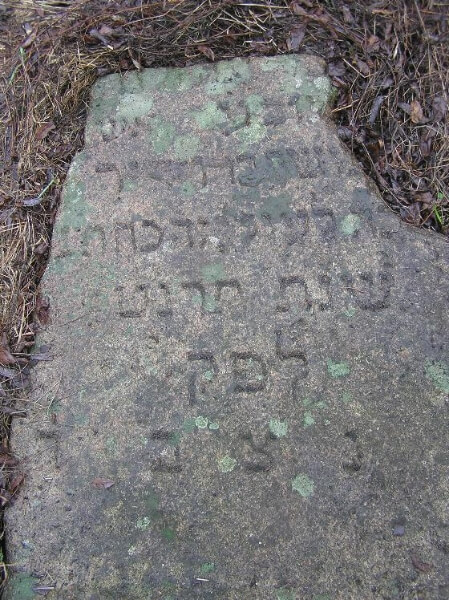
פֿײַגנבערגס בוך הײבט זיך אָן מיט אַ פּאָרטרעט פֿון ייִדיש לעבן אין דובאָװע פֿאַר די קאַטאַסטראָפֿעס פֿון 1919. די באַשרײַבונג איז װיכטיק װײַל דובאָװע איז דווקא נישט געװען ספּעציעל װיכטיק. ס’איז געװען סתּם אַ שטעטל, װוּ אַן ערך טױזנט פּשוטע ייִדן האָבן פֿאַרדינט ברױט, אױפֿגעצױגן קינדער, געפּראַװעט שבת און זיך געקריגט װעגן קלײניקײטן. יאָרן לאַנג האָבן זײ געװױנט מער־װײניקער בשלום צװישן דובאָװעס נישט־ייִדישע פּױערים. װען פֿײַגנבערג באַשרײַבט די פּאָגראָמען פֿילט מען דעם שאָק װאָס די דובאָװער ייִדן האָבן מסתּמא געפֿילט װען אַזאַ טאָג־טעגלעך אָרט איז פֿאַרריסן געװאָרן דורך גװאַלד.
איך האָב געשמועסט מיט דער היסטאָריקערין עליסאַ בן-פורת, װאָס האָט רעדאַקטירט די ענגלישע איבערזעצונג פֿון פֿײַגנבערגס בוך, און האָט אױך אָנגעשריבן די הקדמה. זי האָט מיר געהאָלפֿן פֿאַרשטײן װי און פֿאַר װאָס פֿײַגנבערג האָט מחבר געװען די מעשׂה פֿון דובאָװע, כאָטש זי אַלײן האָט דאָרט קײן מאָל נישט געװױנט.
פֿײַגנבערג איז פֿאַר דער ערשטער װעלט־מלחמה שױן געװען אַ געראָטענע ייִדישע שרײַבערין. „זי איז טאַקע געװען די ערשטע פֿרױ װאָס האָט געאַרבעט װי אַ פּראָפֿעסיאָנעלע מחברטע אױף ייִדיש, װאָס האָט געהאַט פּרנסה פֿון ייִדישער בעלעטריסטיק און זשורנאַליסטיק,“ האָט בן-פורת געזאָגט. נאָך פֿײַגנבערגס חתונה אין 1914 און דעם געבױרן פֿון איר זון האָט זי אָבער אויפֿגעהערט שרײַבן. לױט בן-פורת האָט פֿײַגנבערג „אַנטדעקט אַ נײַ שליחות װי אַ מחברטע“ ערשט נאָך די פּאָגראָמען, אַ שליחות װאָס האָט באַנײַט איר שרײַבערישע קאַריערע.
אין 1919 האָט פֿײַגנבערג געװױנט אין יאַנאָװקע, אוקראַיִנע, נאָענט צו אומאַן און דובאָװע. יענעם זומער האָבן פּאָגראָמיסטן חרובֿ געמאַכט דאָס הױז, װוּ זי האָט געװױנט מיט איר יונגן זון (איר מאַן איז שױן געשטאָרבן). זי האָט שפּעטער באַשריבן װי זי מיט איר קינד זענען אַנטלאָפֿן פֿון יאַנאָװקע איבער װעגן װוּ כוליגאַנען האָבן געזוכט ייִדן צו דערהרגענען. אַ בולגאַרישע פֿרוי וואָס האָט רחמנות געהאַט אויף איר האָט איר געגעבן אַ קלײד מיט די בולגאַרישע נאַציאָנאַלע־פֿאַרבן, צו דינען װי אַ פֿאַרשטעלונג. פֿײַגנבערג האָט געהאָנגען אַ צלם אַרום איר זונעלעס האַלדז. על־פּי נס זענען זײ אָנגעקומען אין אָדעס.
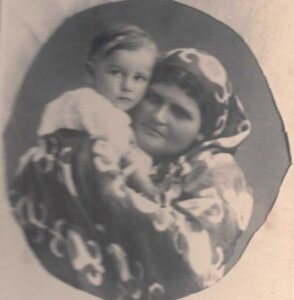
דאָרטן האָט פֿײַגנבערג אינטערװיויִרט די לעבן געבליבענע פֿון די פּאָגראָמען, װאָס האָבן געהאַט אַנטלאָפֿן קײן אָדעס פֿון פֿאַרשײדענע שטעט און שטעטלעך. איר נאָענטער חבֿר, דער שרײַבער מרדכי ספּעקטאָר,אַ געבױרענער אין אומאַן, נאָענט צו יאַנאָװקע און דובאָװע, האָט זי דערמוטיקט צו פֿאַרשרײַבן די אינטערװיוען.
דער באַרימטער היסטאָריקער אליהו טשעריקאָװער, װאָס האָט אױסשעפּיק דאָקומענטירט די פּאָגראָמען פֿון יענער בירגערקריג, האָט זיך דערוווּסט פֿון איר אַרבעט. ער האָט איר געבעטן זי זאָל צוגרײטן אַ באַריכט ספּעציפֿיש װעגן דובאָװע. „דערמיט איז פֿײַגנבערג געװאָרן די אײנציקע פֿרױ װאָס האָט געהאָלפֿן טשעריקאָװערן מיטן צונױפֿנעמען זײַן ריזיקן פּאָגראָם־אַרכיװ, חוץ זײַן אײגענער פֿרױ“, האָט בן-פורת געזאָגט.
פֿײַגנבערגס ערשטער דובאָװע־באַריכט פֿון 1921־ 1922 איז געװען גאַנץ קורץ און תּמציתדיק. במשך פֿון די ווײַטערדיקע יאָרן האָט זי אים איבערגעאַרבעט און אַנטװיקלט אין אַ שפּאַנענדיקער נאַראַציע, װאָס איז אַרױס אין װאַרשע אין 1926. „דער דאָזיקער נוסח באַשרײַבט מײַסטעריש די שטעטלדיקע סבֿיבֿה און די פּערזענלעכקײטן פֿון די פֿאַרשײדנאַרטיקע ייִדן. מע זעט זײ דורך אירע אױגן װי אמתע מענטשן, מיט מעלות און חסרונות,“ האָט בן-פורת געזאָגט.
אױף מיר האָט געמאַכט אַ ספּעציעלן רושם דער דובאָװער רבֿ, משה אַהרן בערדיטשעװסקי — אַ למדן װאָס איז שױן געװען אַן אַלטער אין 1919. ער האָט זיך נישט אַרײַנגעמישט אין די אָרטיקע מחלוקתן, און איז געווען שטאַרק באַליבט. איך קען זיך אױך פֿאָרשטעלן דעם אַפּטײקער װאָס האָט זיך געשעמט מיט דער אײגענער ייִדישקײט און האָט נאָר געהאַט קריסטלעכע חבֿרים. און אױך משה שװאַרצמאַן דער סטעלמאַך (ראָד־מאַכער), אַן אָרעמאַן װאָס האָט זיך אַלע מאָל באַטײַטיק אַרױסגעזאָגט װעגן קהלשע ענינים.
די ערשטע פּאָגראַמען אין דובאָווע האָבן דורכגעפֿירט די אָרטיקע פּויערים — מענטשן װאָס די ייִדן האָבן לאַנג געקענט. פֿײַגנבערג דערצײלט װי די אָנפֿאַלערס האָבן אױסגעפֿאַרבט די פּנימער כּדי מען זאָל זײ נישט דערקענען. די ייִדן האָבן זײ אָבער אַלע דערקענט. שפּעטער האָבן באַנדיט־סאָלדאַטן געפּײַניקט דעם אַלטן רבֿ במשך פֿון אַ פּאָר טעג אײדער זײ האָבן אים דערהרגעט. זײַן קערפּער האָבן זײ געװאָרפֿן אין אַ קאַלך־גרוב צוזאַמען מיט הונדערטער אַנדערע . קרבנות האָט מען אַ מאָל אַפֿילו באַגראָבן לעבעדיקערהייט. אַ סך פֿרויען און מיידלעך האָבן די פּאָגראָמטשיקעס פֿאַרגװאַלדיקט. די פּױערים האָבן ממש חרובֿ געמאַכט דעם ייִדישן בית־עולם און דאָרט פֿאַרפֿלאַנצט תּבֿואה. אַלע ייִדן װאָס זענען נישט אומגעקומען זענען אַנטלאָפֿן.
אין 1927 האָט פֿײַגנבערגס „חורבן דובאָװע“ געשפּילט אַ ראָלע אינעם פּראָצעס פֿון שלום שװאַרצבאָרד, אַ יונגער ייִדישער אַנאַרכיסט װאָס האָט מיט אַ יאָר פֿריִער דערהרגעט דעם מערדער פֿון טויזנטער ייִדן, שימאָן פּעטליוראַ, אין פּאַריז. פּעטליוראַ איז געװען אַן אוקראַיִנישער פּאָליטיקער און אַמאָליקער מיליטאַר־קאָמאַנדיר װאָס שװאַרצבאָרד — װי אַ סך ייִדן — האָט געהאַלטן פֿאַר שולדיק אין אָנפֿירן מיט די פּאָגראָמען. אַ פֿראַנצײזישע איבערזעצונג פֿון פֿײַגנבערגס בוך איז געװען אַ טײל פֿון שוואַרצבאָרדס פֿאַרטײדיקונג, כּדי צו באַשטעטיקן די גרױלן פֿון די פּאָגראָמען. שװאַרצבאָרד איז באַפֿרײַט געװאָרן פֿון שולד.
„אַ דאַנק דער איבערזעצונג אױף ענגליש װעלן נײַע לײענערסאַנטדעקן פֿײַגנבערגס װערק“, האָט בן-פורת געזאָגט. „אַזעלכע טעקסטן קענען באַװירקן אונדזער קוקװינקל סײַ אױף דער געשיכטע, סײַ אױף די הײַנטיקע צײַטן. די מעשׂה פֿון דובאָװע דאַרף זײַן אַ טײל פֿון די דאָזיקע דיסקוסיעס.“
The post When the Jews of Dubova were killed and raped by their neighbors appeared first on The Forward.
Uncategorized
Is the movie ‘Nuremberg’ about the wrong Jewish psychiatrist?
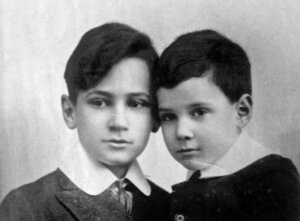
Douglas Kelley, the real-life U.S. Army psychiatrist portrayed by Rami Malek in the recently released motion picture Nuremberg, wrote a book titled 22 Cells in Nuremberg that came out in 1947, a year after he finished his five-month stint at the Nuremberg trials.
Nearly 60 years later, interviews conducted by Leon Goldensohn, a Jewish psychiatrist who replaced Kelley at the historic war crimes trials, were published in The Nuremberg Interviews: An American Psychiatrist’s Conversations with the Defendants and Witnesses. Goldensohn who spent more time with Nazi prisoners than Kelley did, and this book, translated into 16 languages, arguably sheds more light on the Third Reich criminals.
Goldensohn and Kelley were responsible for monitoring both the physical and mental health of the Nazi prisoners, and both their lives ended tragically: Goldensohn died of a heart attack in 1961, five days after his 50th birthday; Kelley died by suicide in front of his family at the age of 45.
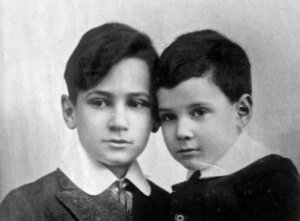
Leon Goldensohn’s son Dan, now 77, said that his father’s interactions with the prisoners were deeper than the ones Kelley had.
“There’s a couple of defendants who say in Leon’s book how much they preferred talking to him,” Dan Goldensohn told me.
One of those defendants was Hermann Goering, the commander of the Luftwaffe, the German air force, who complimented Goldensohn on his technique as a psychiatrist.
“I feel freer to talk to you than to some other psychologists,” Goering told him.
I checked in with Leon Goldensohn’s sons and daughter and their cousins when the movie Nuremberg opened and the actor portraying Douglas Kelley appeared larger than life on the silver screen. The movie was about “the wrong psychiatrist,” Dan Goldensohn told me over the phone.
“We lost our chance to have Leon’s work once again in the public eye, because of Kelley,” Dan said. “When people talk about an Army psychiatrist at Nuremberg, Kelley’s name comes up. Leon’s name hardly does. Anyway, we have our jealousies.”
A French production company did make an hour-long program based on the Goldensohn book that aired on The History Channel, but the psychiatrist’s surviving relatives said it was not well done. Dan Goldensohn said the family came close to signing a deal with an Italian company for a film or TV series based on the book.
“It suddenly collapsed as soon as they heard that this other movie was signed with real actors and a real director,” he said.
‘The best brother in the world’
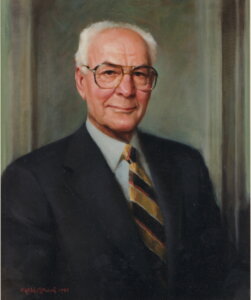
Dr. Eli Goldensohn, a world-renowned neurologist at Columbia University who died in 2013 at 98, took up the book project when he retired at the age of 83. Eli, who was four years younger than Leon, spent 10 years gathering and organizing materials, writing short summaries of all the interviews, and transcribing all those that hadn’t been transcribed. Eventually, he donated his brother’s papers to the U.S. Holocaust Memorial Museum.
When the book was published in the fall of 2004, Eli Goldensohn told me his only disappointment was that it “didn’t really describe Leon’s wonderful war record.” Leon Goldensohn had been Division Psychiatrist of the 63rd Infantry Division, which fought in France and Germany, and received several decorations for service on the front lines.
Eli remembered his older brother fondly.
“The Nazi prisoners respected Leon because he was an objective person and was fundamentally a gentleman who was able to meet them on any level,” Eli told me back in 2004. “He was the best brother in the world. I did this book to memorialize the existence of one of the finest people I ever knew.”
Anticipating Hannah Arendt
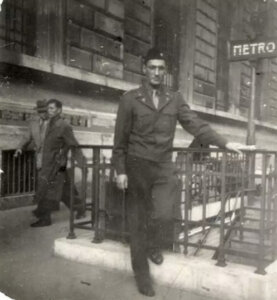
Eli Goldensohn’s son and daughter assisted him on the book. Ellen Goldensohn, who had served as editor-in-chief of Natural History magazine for many years, helped with the copyediting. Her brother Marty Goldensohn, a veteran of public radio newsrooms, introduced Eli to his friend Jim Bouton, the former Yankee pitcher and best-selling author, who convinced Eli to pursue a deal with a major commercial publisher. (Eli ended up signing with Knopf, where the interviews were turned into a book by Ashbel Green, the editor who had worked with such dissident writers as Andrei Sakharov, Jacobo Timerman and Vaclav Havel.)
Ellen Goldensohn said her uncle Leon’s work was prescient, given that it came 17 years before Hannah Arendt’s Eichmann in Jerusalem: A Report on the Banality of Evil.
“In 1946 he really knew the banality of evil and what was asked of these people who ran the Nazi regime,” she told me.
Marty Goldensohn remembers that his mother Betty, who lived to be 101, complained about her husband commandeering the extra bedroom in their assisted living apartment for the book project.
“Eli, get these file boxes out of here or I’m going over to the other side,” she joked, the other side being the Third Reich.
Marty said his father’s labor of love on the book was motivated, in part, by a sense of history, something he shared with his brother Leon.
“Leon was a Jewish doctor and he had compassion,” Marty told me. “He was in the middle of something that the historian Tony Judt once described as ‘a seam of evil.’ He was at the seam and how could he resist asking the key questions that had to do with the horror that had been perpetrated?”
The ‘Good’ German
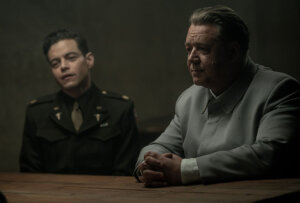
Of the 476 pages in The Nuremberg Interviews, 33 are devoted to Goering, who told Goldensohn he was nauseated by Picasso, referred to the virulently antisemitic newspaper Der Sturmer as “that stupid journal” and claimed that of all the accusations leveled against him, the charge of looting art treasures caused him the most anguish.
In conversations with Goldensohn, Goering insisted that he was never antisemitic, that Adolph Hitler was a great leader who was betrayed by some of his subordinates and that he, Goering, would go down in history as a man who did much for the German people.
When Leon Goldensohn pressed Goering on his culpability in the genocide of European Jewry, the prisoner gave a classic “Good German” defense: “Certainly, as second man in the state under Hitler, I heard rumors about mass killings of Jews, but I could do nothing about it and I knew that it was useless to investigate these rumors and to find out about them accurately, which would not have been too hard, but I was busy with other things,” he said. “And if I had found out what was going on regarding the mass murders, it would simply have made me feel bad and I could do very little to prevent it anyway.”
The post Is the movie ‘Nuremberg’ about the wrong Jewish psychiatrist? appeared first on The Forward.
Uncategorized
Hamas, Islamic Jihad Announce Hostage Body Handover

A Red Cross vehicle, escorted by a van driven by a Hamas terrorist, moves in an area within the so-called “yellow line” to which Israeli troops withdrew under the ceasefire, as Hamas says it continues to search for the bodies of deceased hostages seized during the Oct. 7, 2023, attack on Israel, in Gaza City, Nov. 12, 2025. Photo: REUTERS/Dawoud Abu Alk
The armed wings of Palestinian terrorist groups Hamas and Islamic Jihad said on Thursday they would hand over the body of a hostage at 8 pm local time (1800 GMT), though Israel said it had not received any official notification of a planned transfer.
Islamic Jihad, which is allied with Hamas and also seized hostages during the Oct. 7, 2023, attack that precipitated the Gaza war, said the body was recovered in the southern Gaza city of Khan Younis.
Under an October ceasefire deal, Hamas released all 20 surviving hostages still held in Gaza in exchange for nearly 2,000 Palestinian prisoners and wartime detainees held by Israel.
The agreement also provided for the return of the remains of 28 hostages in exchange for the remains of 360 militants.
Until Thursday, the remains of four hostages were still held in Gaza.
An Israeli government spokesperson told reporters Israel was unaware of any planned return, despite media reports suggesting the handover could take place later on Thursday.
Uncategorized
Coalition Led by Iraqi PM Sudani Comes First in Iraq’s Election, Commission Says

A man holds a flag of Iraq from a car with an election poster featuring current Prime Minister Mohammed Shia’ al-Sudani, as supporters of the Reconstruction and Development Coalition celebrate after preliminary election results were announced in Baghdad, Iraq, Nov. 12, 2025. Photo: REUTERS/Ahmed Saad
A coalition led by Iraqi Prime Minister Mohammed Shia al-Sudani came first in Iraq’s parliamentary election, the Independent High Electoral Commission said on Wednesday.
His coalition received 1.317 million votes in Tuesday’s election, the commission said.
Reuters reported earlier that Sudani placed first, citing two electoral commission officials with knowledge of the results.
Sudani was seeking a second term in Tuesday’s election, but many disillusioned young voters saw the vote simply as a vehicle for established parties to divide Iraq’s oil wealth.
However, Sudani tried to cast himself as the leader who could make Iraq a success after years of instability, arguing he had moved against established parties that brought him to power.
No party can form a government on its own in Iraq’s 329-member legislature, so parties build alliances with other groups to become an administration, a fraught process that often takes many months.
The final total turnout in Iraq’s parliamentary election reached 56.11 percent, the electoral commission said earlier on Wednesday.
“The voter turnout is clear evidence of another success, reflected in the restoration of confidence in the political system,” Sudani said in a televised speech following the announcement of the initial results.


